形容词
形容词大全
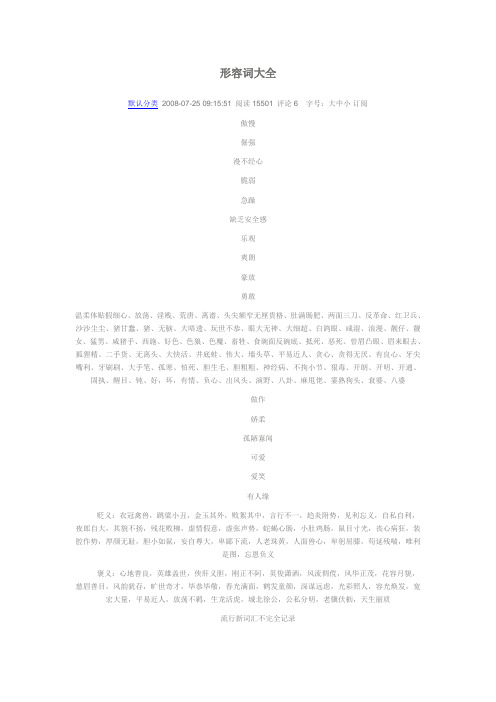
形容词大全默认分类2008-07-25 09:15:51 阅读15501 评论6 字号:大中小订阅傲慢倔强漫不经心脆弱急躁缺乏安全感乐观爽朗豪放勇敢温柔体贴假细心、放荡、淫贱、荒唐、离谱、头尖额窄无厘贵格、肚满肠肥、两面三刀、反革命、红卫兵、沙沙尘尘、猪甘蠢、猪、无脑、大唔透、玩世不恭、眼大无神、大细超、白鸽眼、咸湿、浪漫、靓仔、靓女、猛男、咸猪手、西施、好色、色狼、色魔、畜牲、食碗面反碗底、抵死、恶死、曾眉凸眼、眉耒眼去、狐狸精、二手货、无离头、大快活、井底蛙、伟大、墙头草、平易近人、贪心、贪得无厌、有良心、牙尖嘴利、牙刷刷、大手笔、孤寒、怕死、胆生毛、胆粗粗、神经病、不拘小节、狠毒、开朗、开明、开通、固执、醒目、钝、好,坏,有情、负心、出风头、演野、八卦、麻甩佬、霎熟狗头、衰婆、八婆做作娇柔孤陋寡闻可爱爱笑有人缘贬义:衣冠禽兽,跳梁小丑,金玉其外,败絮其中,言行不一,趋炎附势,见利忘义,自私自利,夜郎自大,其貌不扬,残花败柳,虚情假意,虚张声势,蛇蝎心肠,小肚鸡肠,鼠目寸光,丧心病狂,装腔作势,厚颜无耻,胆小如鼠,妄自尊大,卑鄙下流,人老珠黄,人面兽心,卑躬屈膝,苟延残喘,唯利是图,忘恩负义褒义:心地善良,英雄盖世,侠肝义胆,刚正不阿,英俊潇洒,风流倜傥,风华正茂,花容月貌,慈眉善目,风韵犹存,旷世奇才,毕恭毕敬,春光满面,鹤发童颜,深谋远虑,光彩照人,容光焕发,宽宏大量,平易近人,放荡不羁,生龙活虎,城北徐公,公私分明,老骥伏枥,天生丽质流行新词汇不完全记录汗〕①感叹词,形容词。
被震惊后,尴尬、无奈、无言以对的感觉。
②甘拜下风,自叹不如。
可做动词使用。
〔变体〕:为强化不寒而栗的震惊和恐惧感,常被异化为“寒”。
例句:①楼主观点超强,真是~啊。
②这样都能泡到MM,我~。
和中国第一代互联网粉丝热衷于“靠”、“切”等国产货不同,“汗”的使用者作为后来居上的新生力量,更擅长于拿来主义,将进口产品加以改装之后化为己用。
42个常用形容词
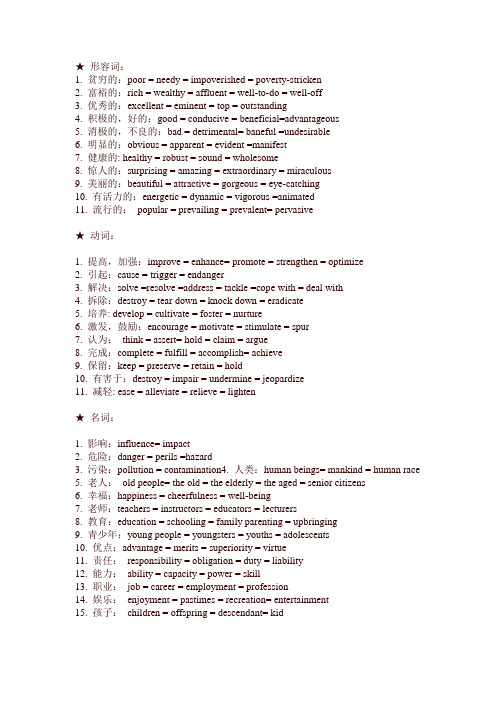
1. 贫穷的:poor = needy = impoverished = poverty-stricken2. 富裕的:rich = wealthy = affluent = well-to-do = well-off3. 优秀的:excellent = eminent = top = outstanding4. 积极的,好的:good = conducive = beneficial=advantageous5. 消极的,不良的:bad = detrimental= baneful =undesirable6. 明显的:obvious = apparent = evident =manifest7. 健康的: healthy = robust = sound = wholesome8. 惊人的:surprising = amazing = extraordinary = miraculous9. 美丽的:beautiful = attractive = gorgeous = eye-catching10. 有活力的:energetic = dynamic = vigorous =animated11. 流行的:popular = prevailing = prevalent= pervasive★动词:1. 提高,加强:improve = enhance= promote = strengthen = optimize2. 引起:cause = trigger = endanger3. 解决:solve =resolve =address = tackle =cope with = deal with4. 拆除:destroy = tear down = knock down = eradicate5. 培养: develop = cultivate = foster = nurture6. 激发,鼓励:encourage = motivate = stimulate = spur7. 认为:think = assert= hold = claim = argue8. 完成:complete = fulfill = accomplish= achieve9. 保留:keep = preserve = retain = hold10. 有害于:destroy = impair = undermine = jeopardize11. 减轻: ease = alleviate = relieve = lighten★名词:1. 影响:influence= impact2. 危险:danger = perils =hazard3. 污染:pollution = contamination4. 人类:human beings= mankind = human race5. 老人:old people= the old = the elderly = the aged = senior citizens6. 幸福:happiness = cheerfulness = well-being7. 老师:teachers = instructors = educators = lecturers8. 教育:education = schooling = family parenting = upbringing9. 青少年:young people = youngsters = youths = adolescents10. 优点:advantage = merits = superiority = virtue11. 责任:responsibility = obligation = duty = liability12. 能力:ability = capacity = power = skill13. 职业:job = career = employment = profession14. 娱乐:enjoyment = pastimes = recreation= entertainment15. 孩子:children = offspring = descendant= kid1. 充满了:be filled with = be awash with = be inundate with = be saturated with2. 努力:struggle for = aspire after = strive for = spare no efforts for3. 从事:embark on = take up = set about = go in for4. 在当代: in contemporarysociety = in present-day society= in this day and age5. 大量的: a host of = a multitude of = a vast number of = a vast amount ofMature,dynamic and honest.思想成熟、精明能干、为人诚实。
形容词大全
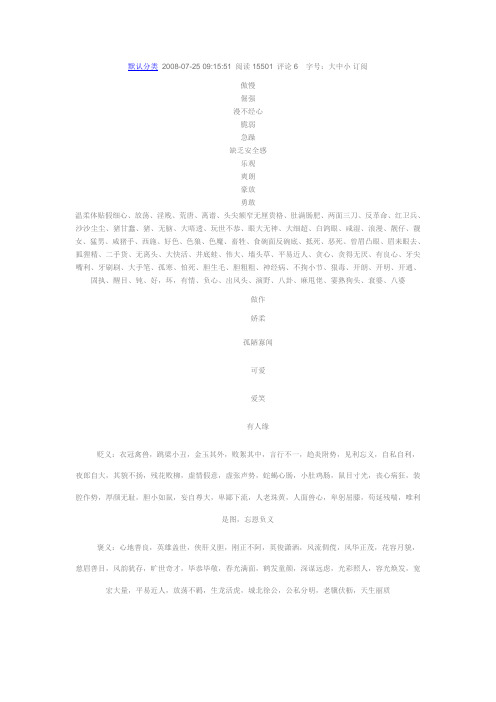
默认分类2008-07-25 09:15:51 阅读15501 评论6 字号:大中小订阅傲慢倔强漫不经心脆弱急躁缺乏安全感乐观爽朗豪放勇敢温柔体贴假细心、放荡、淫贱、荒唐、离谱、头尖额窄无厘贵格、肚满肠肥、两面三刀、反革命、红卫兵、沙沙尘尘、猪甘蠢、猪、无脑、大唔透、玩世不恭、眼大无神、大细超、白鸽眼、咸湿、浪漫、靓仔、靓女、猛男、咸猪手、西施、好色、色狼、色魔、畜牲、食碗面反碗底、抵死、恶死、曾眉凸眼、眉耒眼去、狐狸精、二手货、无离头、大快活、井底蛙、伟大、墙头草、平易近人、贪心、贪得无厌、有良心、牙尖嘴利、牙刷刷、大手笔、孤寒、怕死、胆生毛、胆粗粗、神经病、不拘小节、狠毒、开朗、开明、开通、固执、醒目、钝、好,坏,有情、负心、出风头、演野、八卦、麻甩佬、霎熟狗头、衰婆、八婆做作娇柔孤陋寡闻可爱爱笑有人缘贬义:衣冠禽兽,跳梁小丑,金玉其外,败絮其中,言行不一,趋炎附势,见利忘义,自私自利,夜郎自大,其貌不扬,残花败柳,虚情假意,虚张声势,蛇蝎心肠,小肚鸡肠,鼠目寸光,丧心病狂,装腔作势,厚颜无耻,胆小如鼠,妄自尊大,卑鄙下流,人老珠黄,人面兽心,卑躬屈膝,苟延残喘,唯利是图,忘恩负义褒义:心地善良,英雄盖世,侠肝义胆,刚正不阿,英俊潇洒,风流倜傥,风华正茂,花容月貌,慈眉善目,风韵犹存,旷世奇才,毕恭毕敬,春光满面,鹤发童颜,深谋远虑,光彩照人,容光焕发,宽宏大量,平易近人,放荡不羁,生龙活虎,城北徐公,公私分明,老骥伏枥,天生丽质流行新词汇不完全记录汗〕①感叹词,形容词。
被震惊后,尴尬、无奈、无言以对的感觉。
②甘拜下风,自叹不如。
可做动词使用。
〔变体〕:为强化不寒而栗的震惊和恐惧感,常被异化为“寒”。
例句:①楼主观点超强,真是~啊。
②这样都能泡到MM,我~。
和中国第一代互联网粉丝热衷于“靠”、“切”等国产货不同,“汗”的使用者作为后来居上的新生力量,更擅长于拿来主义,将进口产品加以改装之后化为己用。
最常用的500个形容词
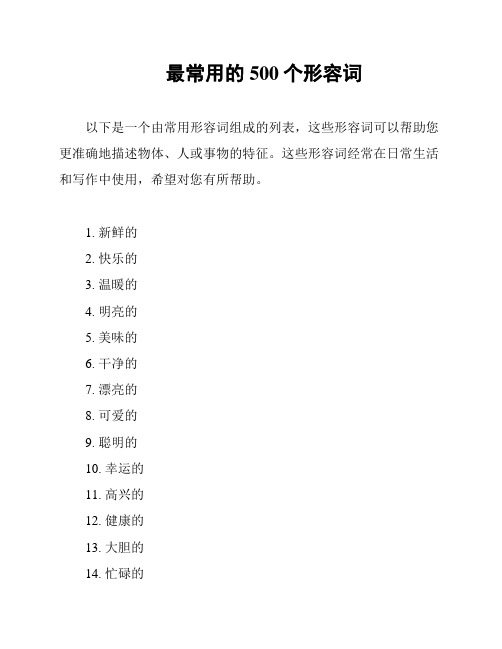
最常用的500个形容词以下是一个由常用形容词组成的列表,这些形容词可以帮助您更准确地描述物体、人或事物的特征。
这些形容词经常在日常生活和写作中使用,希望对您有所帮助。
1. 新鲜的2. 快乐的3. 温暖的4. 明亮的5. 美味的6. 干净的7. 漂亮的8. 可爱的9. 聪明的10. 幸运的11. 高兴的12. 健康的13. 大胆的14. 忙碌的15. 艰难的16. 有趣的17. 和谐的18. 安静的19. 心灵的20. 坚定的21. 确定的22. 大胆的23. 宽敞的24. 安全的25. 胜利的26. 美丽的27. 舒适的28. 高贵的29. 勇敢的30. 自豪的31. 热情的32. 多才多艺的33. 自信的34. 敏锐的35. 高效的36. 优雅的37. 冷静的38. 好奇的39. 羞涩的40. 文雅的41. 诚实的42. 热心的43. 友善的44. 稳定的45. 成功的46. 可靠的47. 敬业的48. 真诚的49. 强大的50. 高尚的51. 热爱的52. 亲切的53. 具有责任感的54. 优秀的55. 开放的56. 协作的57. 灵活的58. 自觉的59. 善良的60. 精力充沛的61. 坚韧的62. 谨慎的63. 有创造力的64. 有条理的65. 知识丰富的66. 有能力的67. 有耐心的68. 幽默的69. 细心的70. 足智多谋的71. 敏感的72. 宜人的73. 谦虚的74. 慷慨的75. 睿智的76. 勤劳的77. 毅力坚定的78. 自律的79. 可信的80. 果断的81. 踏实的82. 深思熟虑的83. 专注的84. 慷慨的85. 超群的86. 好动的87. 温和的88. 克制的89. 坚强的90. 有魅力的91. 灵活的92. 收集信息的93. 解决问题的94. 魅力四射的95. 慷慨大方的96. 独立的97. 易相处的98. 善于倾听的99. 体贴的100. 勇于承担责任的101. 满怀希望的102. 坚忍不拔的103. 随和的104. 幽默感的105. 有远见的106. 机智的107. 善于沟通的108. 适应能力强的109. 深情的110. 爱护的111. 确信的112. 深邃的113. 平衡的114. 才华横溢的115. 实事求是的116. 虚心的117. 明智的118. 细致的119. 博学的120. 独立思考的121. 勇于尝试的122. 自律的123. 进取的124. 敢于冒险的125. 冷静的126. 热心肠的127. 从容不迫的128. 调和的129. 激励人心的130. 敏捷的131. 追求卓越的132. 热爱生活的133. 真实的134. 杰出的135. 有见识的136. 有原则的137. 锲而不舍的138. 坚韧不拔的139. 具有同情心的140. 可信赖的141. 积极的142. 健谈的143. 爽快的144. 耐心的145. 独特的146. 巧妙的147. 专业的148. 虚心的149. 坚固的150. 自信的151. 严肃的152. 爱思考的153. 善于观察的154. 允许的155. 懂得尊重的156. 勇敢的157. 温柔的158. 冲劲四射的159. 对细节敏感的160. 爱研究的161. 责任心强的162. 高效率的163. 乐观的164. 职业道德高尚的165. 可靠的166. 善于解决问题的167. 奉献精神的168. 亲近的169. 富有同情心的170. 明确的171. 灵巧的172. 冷静的173. 强大的174. 有判断力的175. 顾全大局的176. 有影响力的177. 矫健的178. 豁达的179. 忍耐力强的180. 热心肠的181. 对身体健康负责的182. 机敏的183. 资深的184. 机警的185. 卓越的186. 专一的187. 成熟的188. 精神抖擞的189. 适应能力强的190. 富有想象力的191. 勤奋的192. 冲劲足的193. 善于倾听的194. 超级的195. 令人愉快的196. 高效的197. 慈悲为怀的198. 充满激情的199. 热衷于帮助他人的200. 有远见的201. 平易近人的202. 早起的203. 负责的204. 善于组织的205. 具有推理能力的206. 细致入微的207. 深思熟虑的208. 适应能力强的209. 灵活的210. 具有人际关系能力的211. 宽容的212. 彬彬有礼的213. 诚实正直的214. 果断的215. 愿意接受挑战的216. 面带微笑的217. 能言善道的218. 坚韧不拔的219. 出色的220. 自律的221. 迎接挑战的222. 明智的223. 眼光独到的224. 深思熟虑的225. 果断的226. 在困境中挺身而出的227. 富有激励力的228. 主动的229. 诚实的230. 灵活的231. 忍耐力强的232. 准确的233. 具有安全意识的234. 温和的235. 心思细腻的236. 支持性的237. 联系密切的238. 高效工作的239. 深思熟虑的240. 尊重他人的241. 善于总结的242. 知识渊博的243. 具有幽默感的244. 独立自主的245. 强大的246. 成功的247. 精明的248. 富有耐心的249. 意志坚定的250. 懂得尊重的251. 强有力的252. 机敏的253. 表达能力强的254. 有条理的255. 准确的256. 有魅力的257. 果断的258. 负责的259. 自立的260. 具有影响力的261. 具有责任感的262. 具有创造力的263. 有组织能力的264. 坚强的265. 放松的266. 意欲盎然的267. 通情达理的268. 具有决断力的269. 机会主义者的270. 善于思考的271. 理智的272. 策略性的273. 稳重的274. 果断的275. 喜欢冒险的276. 热心肠的277. 团队合作的278. 热爱生活的279. 优雅的280. 经验丰富的281. 均衡的282. 多元化的283. 有魅力的284. 整洁的285. 机智的286. 合算的287. 理性的288. 追求卓越的289. 幕后的290. 善于分析的291. 敏感的292. 灵巧的293. 创造新想法的294. 强大的295. 果断的296. 肯付出努力的297. 高强度的298. 团队合作的299. 融洽的300. 令人赞叹的301. 具有思维敏捷性的302. 着迷的303. 理解力强的304. 明智的305. 理念新颖的306. 谦逊的307. 加油的308. 保持冷静的309. 探索冒险的310. 热情高涨的311. 忍耐啊的312. 率真的313. 抗压能力强的314. 积极的315. 注重安全性的316. 专注的317. 意志坚定的318. 高品质的319. 富有创造力的320. 易相处的321. 才华横溢的322. 卓越的323. 果断的324. 有序的325. 富有活力的326. 具有同理心的327. 有经验的328. 开放的329. 逻辑思维的330. 机智的331. 善于观察的332. 真实的333. 勇于承担责任的334. 善于沟通的335. 积极的336. 具有判断力的337. 善于理解的338. 迅速的339. 突出的340. 具有启发性的341. 倡导实用主义的342. 有条理的343. 深思熟虑的344. 有主见的345. 追求完美的346. 才情出众的347. 幽默风趣的348. 多情的349. 善于协调的350. 爱人的351. 具有共同目标的352. 开朗的353. 勇者354. 杰出的355. 熟的356. 乐于助人的357. 谦虚的358. 研究能力强的359. 稳健的360. 积极的361. 成熟的362. 工作态度端正的363. 内省的364. 有信心的365. 具有领导才能的366. 具有耐心的367. 理性的368. 独立的369. 高效率的370. 解决问题能力强的371. 朝气蓬勃的372. 重要的373. 负有责任感的374. 灵活性高的375. 适应能力强的376. 加油干的377. 忠实的378. 具有深度的379. 灵敏的380. 圆滑的381. 多样化的382. 灵巧的383. 好学的384. 经验深入的385. 多才多艺的386. 精确的387. 具有责任感的388. 绝佳的389. 勇于妥协的390. 热心的391. 沉着的392. 慷慨的393. 具有政治觸覺的394. 开放心态的395. 善于指导的396. 弯曲的397. 忍耐力强的398. 精确无误的399. 真实的400. 善于观察的401. 毅力坚强的402. 诚实正直的403. 具有共同目标的404. 明智的405. 稳健的406. 理想化的407. 积极的408. 坚定的409. 高品质的410. 热衷于研究的411. 独立性强的412. 缜密的413. 乐于合作的414. 适应能力强的415. 高效率的416. 冷静的417. 多情的418. 观察力。
形容词大全
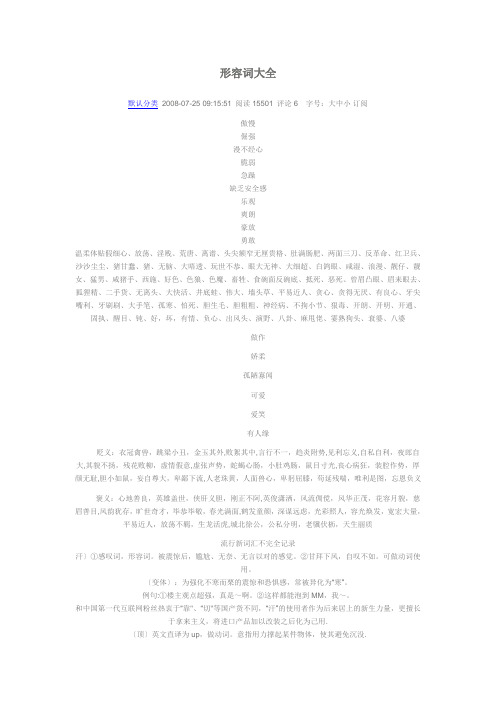
形容词大全默认分类2008-07-25 09:15:51 阅读15501 评论6 字号:大中小订阅傲慢倔强漫不经心脆弱急躁缺乏安全感乐观爽朗豪放勇敢温柔体贴假细心、放荡、淫贱、荒唐、离谱、头尖额窄无厘贵格、肚满肠肥、两面三刀、反革命、红卫兵、沙沙尘尘、猪甘蠢、猪、无脑、大唔透、玩世不恭、眼大无神、大细超、白鸽眼、咸湿、浪漫、靓仔、靓女、猛男、咸猪手、西施、好色、色狼、色魔、畜牲、食碗面反碗底、抵死、恶死、曾眉凸眼、眉耒眼去、狐狸精、二手货、无离头、大快活、井底蛙、伟大、墙头草、平易近人、贪心、贪得无厌、有良心、牙尖嘴利、牙刷刷、大手笔、孤寒、怕死、胆生毛、胆粗粗、神经病、不拘小节、狠毒、开朗、开明、开通、固执、醒目、钝、好,坏,有情、负心、出风头、演野、八卦、麻甩佬、霎熟狗头、衰婆、八婆做作娇柔孤陋寡闻可爱爱笑有人缘贬义:衣冠禽兽,跳梁小丑,金玉其外,败絮其中,言行不一,趋炎附势,见利忘义,自私自利,夜郎自大,其貌不扬,残花败柳,虚情假意,虚张声势,蛇蝎心肠,小肚鸡肠,鼠目寸光,丧心病狂,装腔作势,厚颜无耻,胆小如鼠,妄自尊大,卑鄙下流,人老珠黄,人面兽心,卑躬屈膝,苟延残喘,唯利是图,忘恩负义褒义:心地善良,英雄盖世,侠肝义胆,刚正不阿,英俊潇洒,风流倜傥,风华正茂,花容月貌,慈眉善目,风韵犹存,旷世奇才,毕恭毕敬,春光满面,鹤发童颜,深谋远虑,光彩照人,容光焕发,宽宏大量,平易近人,放荡不羁,生龙活虎,城北徐公,公私分明,老骥伏枥,天生丽质流行新词汇不完全记录汗〕①感叹词,形容词。
被震惊后,尴尬、无奈、无言以对的感觉。
②甘拜下风,自叹不如。
可做动词使用。
〔变体〕:为强化不寒而栗的震惊和恐惧感,常被异化为“寒”。
例句:①楼主观点超强,真是~啊。
②这样都能泡到MM,我~。
和中国第一代互联网粉丝热衷于“靠"、“切"等国产货不同,“汗”的使用者作为后来居上的新生力量,更擅长于拿来主义,将进口产品加以改装之后化为己用.〔顶〕英文直译为up,做动词。
形容词大全 (2)
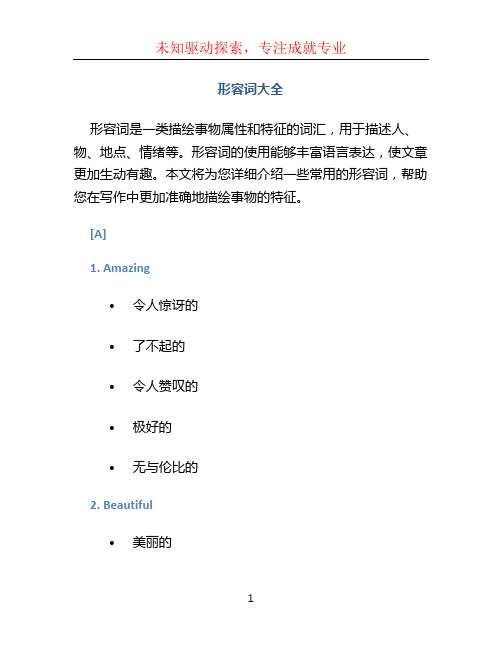
形容词大全形容词是一类描绘事物属性和特征的词汇,用于描述人、物、地点、情绪等。
形容词的使用能够丰富语言表达,使文章更加生动有趣。
本文将为您详细介绍一些常用的形容词,帮助您在写作中更加准确地描绘事物的特征。
[A]1. Amazing•令人惊讶的•了不起的•令人赞叹的•极好的•无与伦比的2. Beautiful•美丽的•迷人的•绚丽的•靓丽的3. Creative•创造性的•有创意的•富有创造力的•独特的•奇特的4. Delightful•令人愉快的•可爱的•令人高兴的•欢快的5. Exciting•令人兴奋的•肾上腺素飙升的•刺激的•激动人心的•令人激动的[B]1. Brave•勇敢的•英勇的•毅力坚定的•坚韧不拔的•无畏的2. Clever•聪明的•机智的•精明的•反应敏捷的•异常聪慧的3. Energetic•精力充沛的•活力四溢的•充满活力的•精神饱满的•精力旺盛的4. Friendly•友好的•友善的•和蔼可亲的•热情友好的•亲切的5. Generous•慷慨的•大方的•宽大的•慷慨的•慷慨解囊的[C]1. Charming•迷人的•有魅力的•优雅的•吸引人的•富有魅力的2. Dynamic•充满活力的•富有活力的•动感的•灵活的•充满动力的3. Intelligent•聪明的•智慧的•理智的•足智多谋的•明智的4. Optimistic•乐观的•积极的•正面的•具有乐观态度的•充满希望的5. Reliable•可靠的•可信赖的•确实的•值得信赖的•可依赖的[D]1. Dazzling•炫目的•闪耀的•耀眼的•光彩夺目的•灿烂的2. Gentle•温和的•文雅的•和善的•温柔的•有礼貌的3. Honest•诚实的•正直的•坦诚的•可信的•不欺骗的4. Modest•谦虚的•适度的•谦逊的•不夸张的•羞怯的5. Reliable•可靠的•可信赖的•确实的•值得信赖的•可依赖的在写作中运用丰富多样的形容词,可以使文章更加生动有趣,打动读者的心。
(完整版)常用形容词大全
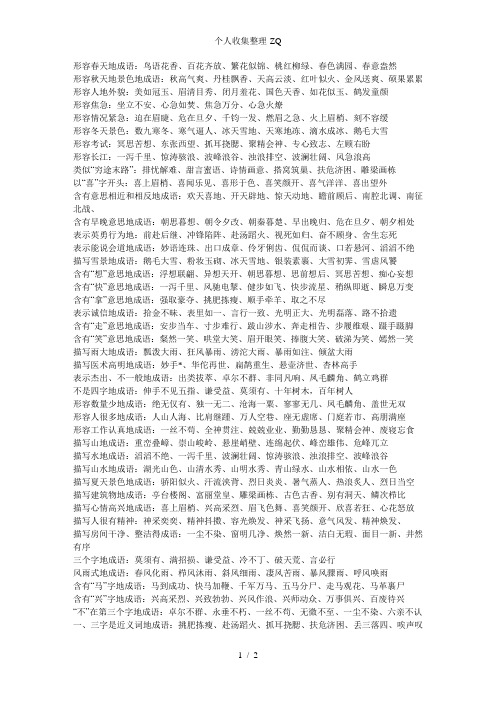
形容春天地成语:鸟语花香、百花齐放、繁花似锦、桃红柳绿、春色满园、春意盎然形容秋天地景色地成语:秋高气爽、丹桂飘香、天高云淡、红叶似火、金风送爽、硕果累累形容人地外貌:美如冠玉、眉清目秀、闭月羞花、国色天香、如花似玉、鹤发童颜形容焦急:坐立不安、心急如焚、焦急万分、心急火燎形容情况紧急:迫在眉睫、危在旦夕、千钧一发、燃眉之急、火上眉梢、刻不容缓形容冬天景色:数九寒冬、寒气逼人、冰天雪地、天寒地冻、滴水成冰、鹅毛大雪形容考试:冥思苦想、东张西望、抓耳挠腮、聚精会神、专心致志、左顾右盼形容长江:一泻千里、惊涛骇浪、波峰浪谷、浊浪排空、波澜壮阔、风急浪高类似“穷途末路”:排忧解难、甜言蜜语、诗情画意、搭窝筑巢、扶危济困、雕梁画栋以“喜”字开头:喜上眉梢、喜闻乐见、喜形于色、喜笑颜开、喜气洋洋、喜出望外含有意思相近和相反地成语:欢天喜地、开天辟地、惊天动地、瞻前顾后、南腔北调、南征北战、含有早晚意思地成语:朝思暮想、朝令夕改、朝秦暮楚、早出晚归、危在旦夕、朝夕相处表示英勇行为地:前赴后继、冲锋陷阵、赴汤蹈火、视死如归、奋不顾身、舍生忘死表示能说会道地成语:妙语连珠、出口成章、伶牙俐齿、侃侃而谈、口若悬河、滔滔不绝描写雪景地成语:鹅毛大雪、粉妆玉砌、冰天雪地、银装素裹、大雪初霁、雪虐风饕含有“想”意思地成语:浮想联翩、异想天开、朝思暮想、思前想后、冥思苦想、痴心妄想含有“快”意思地成语:一泻千里、风驰电掣、健步如飞、快步流星、稍纵即逝、瞬息万变含有“拿”意思地成语:强取豪夺、挑肥拣瘦、顺手牵羊、取之不尽表示诚信地成语:拾金不昧、表里如一、言行一致、光明正大、光明磊落、路不拾遗含有“走”意思地成语:安步当车、寸步难行、跋山涉水、奔走相告、步履维艰、蹑手蹑脚含有“笑”意思地成语:粲然一笑、哄堂大笑、眉开眼笑、捧腹大笑、破涕为笑、嫣然一笑描写雨大地成语:瓢泼大雨、狂风暴雨、滂沱大雨、暴雨如注、倾盆大雨描写医术高明地成语:妙手*、华佗再世、扁鹊重生、悬壶济世、杏林高手表示杰出、不一般地成语:出类拔萃、卓尔不群、非同凡响、凤毛麟角、鹤立鸡群不是四字地成语:伸手不见五指、谦受益、莫须有、十年树木,百年树人形容数量少地成语:绝无仅有、独一无二、沧海一粟、寥寥无几、凤毛麟角、盖世无双形容人很多地成语:人山人海、比肩继踵、万人空巷、座无虚席、门庭若市、高朋满座形容工作认真地成语:一丝不苟、全神贯注、兢兢业业、勤勤恳恳、聚精会神、废寝忘食描写山地成语:重峦叠嶂、崇山峻岭、悬崖峭壁、连绵起伏、峰峦雄伟、危峰兀立描写水地成语:滔滔不绝、一泻千里、波澜壮阔、惊涛骇浪、浊浪排空、波峰浪谷描写山水地成语:湖光山色、山清水秀、山明水秀、青山绿水、山水相依、山水一色描写夏天景色地成语:骄阳似火、汗流浃背、烈日炎炎、暑气蒸人、热浪炙人、烈日当空描写建筑物地成语:亭台楼阁、富丽堂皇、雕梁画栋、古色古香、别有洞天、鳞次栉比描写心情高兴地成语:喜上眉梢、兴高采烈、眉飞色舞、喜笑颜开、欣喜若狂、心花怒放描写人很有精神:神采奕奕、精神抖擞、容光焕发、神采飞扬、意气风发、精神焕发、描写房间干净、整洁得成语:一尘不染、窗明几净、焕然一新、洁白无瑕、面目一新、井然有序三个字地成语:莫须有、满招损、谦受益、冷不丁、破天荒、言必行风雨式地成语:春风化雨、栉风沐雨、斜风细雨、凄风苦雨、暴风骤雨、呼风唤雨含有“马”字地成语:马到成功、快马加鞭、千军万马、五马分尸、走马观花、马革裹尸含有“兴”字地成语:兴高采烈、兴致勃勃、兴风作浪、兴师动众、万事俱兴、百废待兴“不”在第三个字地成语:卓尔不群、永垂不朽、一丝不苟、无微不至、一尘不染、六亲不认一、三字是近义词地成语:挑肥拣瘦、赴汤蹈火、抓耳挠腮、扶危济困、丢三落四、唉声叹气含有两个人体器官地成语:狼心狗肺、张口结舌、鸡毛蒜皮、目瞪口呆、七手八脚、瞠目结舌形容事物很大地成语:庞然大物、硕大无朋、硕大无比、宏伟壮观含有两个动物名称地成语:鸡飞狗走、虎头蛇尾、生龙活虎、鸡鸣狗盗、羊落虎口、狼狈为* 描写花地成语:花团锦簇、繁花似锦、百花齐放、姹紫嫣红、迎风吐艳含有贬义地成语:自私自利、口是心非、狼狈为*、阴谋鬼计、阳奉阴违、丧家之犬、含有褒义地成语:舍己为人、奋不顾身、拾金不昧、赴汤蹈火、万古长存、舍生忘死形容刻苦学习地成语:废寝忘食、十载寒窗、悬梁刺股、程门立雪、囊萤映雪、凿壁借光来源于寓言故事:拔苗助长、守株待兔、自相矛盾、掩耳盗铃、滥竽充数、亡羊补牢来源于神话故事:夸父追日、嫦娥奔月、后羿射日、精卫填海、女娲补天、哪吒闹海来源于历史故事:四面楚歌、纸上谈兵、背水一战、负荆请罪、卧薪尝胆、洛阳纸贵描写天空景色地成语:万里无云、碧空如洗、湛蓝如洗、天高云淡、乌云密布、晴空万里古代巧妙地计策:三十六计,走为上、瞒天过海、反客为主、围魏救赵、借刀杀人、草船借箭描写人物慌张地成语:心慌意乱、惊慌失措、惶恐不安、慌不择路、落荒而逃与读书有关地成语:韦编三绝、一览成诵、一目十行、过目不忘、走马观花、博览群书含有“一”但不在开头:千钧一发、千虑一得、不堪一击、万众一心、九死一生、万无一失含有两个“看”:高瞻远瞩、左顾右盼、东张西望、察言观色、瞻前顾后、熟视无睹、形容书地内容精彩:引人入胜、精妙绝伦、扣人心弦、韵味无穷、精彩纷呈、百看不厌运动场上地运动员们:针锋相对、汗流浃背、争先恐后、大汗淋漓“专心致志”地近义词:全神贯注、一丝不苟、聚精会神、心无旁若、心无二用表示精神永久地:永垂不朽、万古长存、万世流芳、千古流芳、万古常青做事情有把握地:稳操胜券、成竹在胸、胜券在握、十拿九稳、形容没有退路地:穷途末路、日暮途穷、走投无路、山穷水尽、形容关心他人地:无微不至、体贴入微、抑强扶弱、急公好义、嘘寒问暖、描写态度和蔼地:平易近人、和蔼可亲、合声细语、笑容可掬、笑容满面含有两个数字地成语:三心二意、五湖四海、五花八门、一心一意、横七竖八、七嘴八舌表示悔过自新地:幡然悔悟、迷途知返、弃旧图新、浪子回头、洗心革面、改恶从善描写花地成语:万紫千红、姹紫嫣红、五颜六色、含苞欲放、百花齐放、花团锦簇。
常用形容词大全
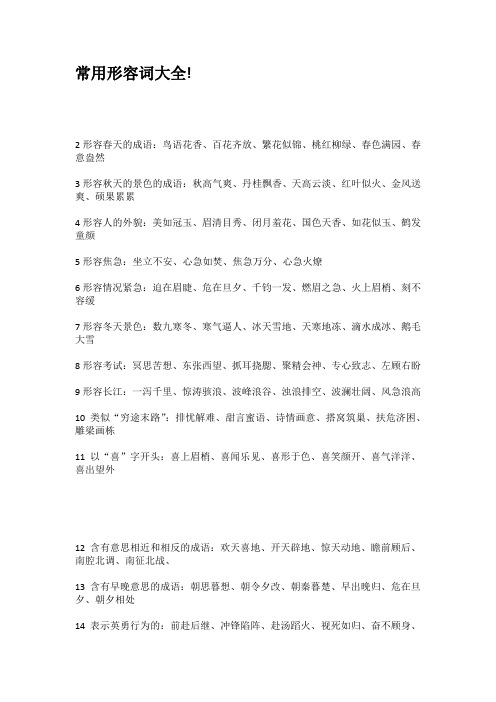
常用形容词大全!2形容春天的成语:鸟语花香、百花齐放、繁花似锦、桃红柳绿、春色满园、春意盎然3形容秋天的景色的成语:秋高气爽、丹桂飘香、天高云淡、红叶似火、金风送爽、硕果累累4形容人的外貌:美如冠玉、眉清目秀、闭月羞花、国色天香、如花似玉、鹤发童颜5形容焦急:坐立不安、心急如焚、焦急万分、心急火燎6形容情况紧急:迫在眉睫、危在旦夕、千钧一发、燃眉之急、火上眉梢、刻不容缓7形容冬天景色:数九寒冬、寒气逼人、冰天雪地、天寒地冻、滴水成冰、鹅毛大雪8形容考试:冥思苦想、东张西望、抓耳挠腮、聚精会神、专心致志、左顾右盼9形容长江:一泻千里、惊涛骇浪、波峰浪谷、浊浪排空、波澜壮阔、风急浪高10类似“穷途末路”:排忧解难、甜言蜜语、诗情画意、搭窝筑巢、扶危济困、雕梁画栋11以“喜”字开头:喜上眉梢、喜闻乐见、喜形于色、喜笑颜开、喜气洋洋、喜出望外12含有意思相近和相反的成语:欢天喜地、开天辟地、惊天动地、瞻前顾后、南腔北调、南征北战、13含有早晚意思的成语:朝思暮想、朝令夕改、朝秦暮楚、早出晚归、危在旦夕、朝夕相处14表示英勇行为的:前赴后继、冲锋陷阵、赴汤蹈火、视死如归、奋不顾身、舍生忘死15表示能说会道的成语:妙语连珠、出口成章、伶牙俐齿、侃侃而谈、口若悬河、滔滔不绝16描写雪景的成语:鹅毛大雪、粉妆玉砌、冰天雪地、银装素裹、大雪初霁、雪虐风饕17含有“想”意思的成语:浮想联翩、异想天开、朝思暮想、思前想后、冥思苦想、痴心妄想18含有“快”意思的成语:一泻千里、风驰电掣、健步如飞、快步流星、稍纵即逝、瞬息万变19含有“拿”意思的成语:强取豪夺、挑肥拣瘦、顺手牵羊、取之不尽20表示诚信的成语:拾金不昧、表里如一、言行一致、光明正大、光明磊落、路不拾遗21含有“走”意思的成语:安步当车、寸步难行、跋山涉水、奔走相告、步履维艰、蹑手蹑脚22含有“笑”意思的成语:粲然一笑、哄堂大笑、眉开眼笑、捧腹大笑、破涕为笑、嫣然一笑23描写雨大的成语:瓢泼大雨、狂风暴雨、滂沱大雨、暴雨如注、倾盆大雨24描写医术高明的成语:妙手*、华佗再世、扁鹊重生、悬壶济世、杏林高手25表示杰出、不一般的成语:出类拔萃、卓尔不群、非同凡响、凤毛麟角、鹤立鸡群26不是四字的成语:伸手不见五指、谦受益、莫须有、十年树木,百年树人27形容数量少的成语:绝无仅有、独一无二、沧海一粟、寥寥无几、凤毛麟角、盖世无双28形容人很多的成语:人山人海、比肩继踵、万人空巷、座无虚席、门庭若市、高朋满座29形容工作认真的成语:一丝不苟、全神贯注、兢兢业业、勤勤恳恳、聚精会神、废寝忘食30描写山的成语:重峦叠嶂、崇山峻岭、悬崖峭壁、连绵起伏、峰峦雄伟、危峰兀立31描写水的成语:滔滔不绝、一泻千里、波澜壮阔、惊涛骇浪、浊浪排空、波峰浪谷32描写山水的成语:湖光山色、山清水秀、山明水秀、青山绿水、山水相依、山水一色33描写夏天景色的成语:骄阳似火、汗流浃背、烈日炎炎、暑气蒸人、热浪炙人、烈日当空34描写建筑物的成语:亭台楼阁、富丽堂皇、雕梁画栋、古色古香、别有洞天、鳞次栉比35描写心情高兴的成语:喜上眉梢、兴高采烈、眉飞色舞、喜笑颜开、欣喜若狂、心花怒放36描写人很有精神:神采奕奕、精神抖擞、容光焕发、神采飞扬、意气风发、精神焕发、37描写房间干净、整洁得成语:一尘不染、窗明几净、焕然一新、洁白无瑕、面目一新、井然有序38三个字的成语:莫须有、满招损、谦受益、冷不丁、破天荒、言必行39A风B雨式的成语:春风化雨、栉风沐雨、斜风细雨、凄风苦雨、暴风骤雨、呼风唤雨40含有“马”字的成语:马到成功、快马加鞭、千军万马、五马分尸、走马观花、马革裹尸41含有“兴”字的成语:兴高采烈、兴致勃勃、兴风作浪、兴师动众、万事俱兴、百废待兴42“不”在第三个字的成语:卓尔不群、永垂不朽、一丝不苟、无微不至、一尘不染、六亲不认43一、三字是近义词的成语:挑肥拣瘦、赴汤蹈火、抓耳挠腮、扶危济困、丢三落四、唉声叹气44含有两个人体器官的成语:狼心狗肺、张口结舌、鸡毛蒜皮、目瞪口呆、七手八脚、瞠目结舌45形容事物很大的成语:庞然大物、硕大无朋、硕大无比、宏伟壮观46含有两个动物名称的成语:鸡飞狗走、虎头蛇尾、生龙活虎、鸡鸣狗盗、羊落虎口、狼狈为*47描写花的成语:花团锦簇、繁花似锦、百花齐放、姹紫嫣红、迎风吐艳48含有贬义的成语:自私自利、口是心非、狼狈为*、阴谋鬼计、阳奉阴违、丧家之犬、49含有褒义的成语:舍己为人、奋不顾身、拾金不昧、赴汤蹈火、万古长存、舍生忘死50形容刻苦学习的成语:废寝忘食、十载寒窗、悬梁刺股、程门立雪、囊萤映雪、凿壁借光51来源于寓言故事:拔苗助长、守株待兔、自相矛盾、掩耳盗铃、滥竽充数、亡羊补牢52来源于神话故事:夸父追日、嫦娥奔月、后羿射日、精卫填海、女娲补天、哪吒闹海53来源于历史故事:四面楚歌、纸上谈兵、背水一战、负荆请罪、卧薪尝胆、洛阳纸贵54描写天空景色的成语:万里无云、碧空如洗、湛蓝如洗、天高云淡、乌云密布、晴空万里55古代巧妙的计策:三十六计,走为上、瞒天过海、反客为主、围魏救赵、借刀杀人、草船借箭56描写人物慌张的成语:心慌意乱、惊慌失措、惶恐不安、慌不择路、落荒而逃57与读书有关的成语:韦编三绝、一览成诵、一目十行、过目不忘、走马观花、博览群书58含有“一”但不在开头:千钧一发、千虑一得、不堪一击、万众一心、九死一生、万无一失59含有两个“看”:高瞻远瞩、左顾右盼、东张西望、察言观色、瞻前顾后、熟视无睹、60形容书的内容精彩:引人入胜、精妙绝伦、扣人心弦、韵味无穷、精彩纷呈、百看不厌61运动场上的运动员们:针锋相对、汗流浃背、争先恐后、大汗淋漓62“专心致志”的近义词:全神贯注、一丝不苟、聚精会神、心无旁若、心无二用63表示精神永久的:永垂不朽、万古长存、万世流芳、千古流芳、万古常青64做事情有把握的:稳操胜券、成竹在胸、胜券在握、十拿九稳、65形容没有退路的:穷途末路、日暮途穷、走投无路、山穷水尽、66形容关心他人的:无微不至、体贴入微、抑强扶弱、急公好义、嘘寒问暖、67描写态度和蔼的:平易近人、和蔼可亲、合声细语、笑容可掬、笑容满面68含有两个数字的成语:三心二意、五湖四海、五花八门、一心一意、横七竖八、七嘴八舌69表示悔过自新的:幡然悔悟、迷途知返、弃旧图新、浪子回头、洗心革面、改恶从善70描写花的成语:万紫千红、姹紫嫣红、五颜六色、含苞欲放、百花齐放、花团锦簇。
形容词大全
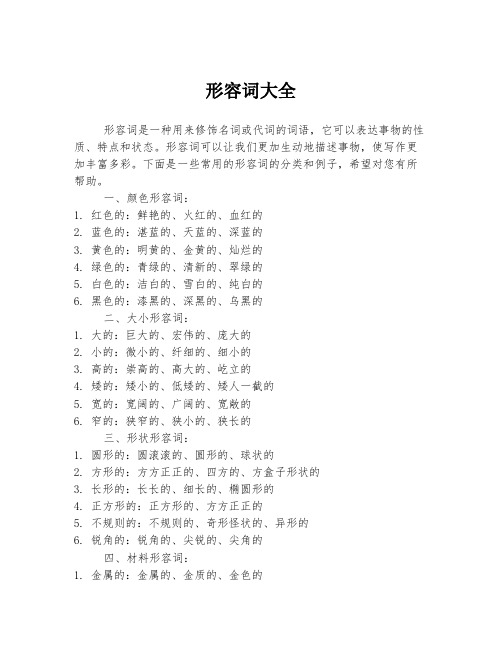
形容词大全形容词是一种用来修饰名词或代词的词语,它可以表达事物的性质、特点和状态。
形容词可以让我们更加生动地描述事物,使写作更加丰富多彩。
下面是一些常用的形容词的分类和例子,希望对您有所帮助。
一、颜色形容词:1. 红色的:鲜艳的、火红的、血红的2. 蓝色的:湛蓝的、天蓝的、深蓝的3. 黄色的:明黄的、金黄的、灿烂的4. 绿色的:青绿的、清新的、翠绿的5. 白色的:洁白的、雪白的、纯白的6. 黑色的:漆黑的、深黑的、乌黑的二、大小形容词:1. 大的:巨大的、宏伟的、庞大的2. 小的:微小的、纤细的、细小的3. 高的:崇高的、高大的、屹立的4. 矮的:矮小的、低矮的、矮人一截的5. 宽的:宽阔的、广阔的、宽敞的6. 窄的:狭窄的、狭小的、狭长的三、形状形容词:1. 圆形的:圆滚滚的、圆形的、球状的2. 方形的:方方正正的、四方的、方盒子形状的3. 长形的:长长的、细长的、椭圆形的4. 正方形的:正方形的、方方正正的5. 不规则的:不规则的、奇形怪状的、异形的6. 锐角的:锐角的、尖锐的、尖角的四、材料形容词:1. 金属的:金属的、金质的、金色的2. 木制的:木质的、木制的、木头做的3. 玻璃制的:透明的、晶莹剔透的、玻璃质的4. 塑料的:塑料的、柔韧的、可塑性的5. 石头的:硬如石头的、石质的、石头做的6. 纸质的:纸状的、纸质的、薄而轻的五、状态形容词:1. 开心的:快乐的、幸福的、喜悦的2. 悲伤的:伤心的、悲痛的、悲哀的3. 紧张的:焦虑的、紧张的、烦躁的4. 放松的:轻松的、宽松的、安逸的5. 疲倦的:疲劳的、困顿的、疲乏的6. 兴奋的:激动的、狂喜的、兴高采烈的六、品质形容词:1. 美丽的:漂亮的、迷人的、绝美的2. 聪明的:机智的、伶俐的、聪慧的3. 善良的:仁慈的、和善的、宽厚的4. 勇敢的:勇猛的、刚毅的、挺身而出的5. 耐心的:恒心的、坚韧的、不急躁的6. 坚强的:坚毅的、顽强的、不屈不挠的以上只是形容词的一小部分例子,还有很多形容词可以用来丰富写作。
汉语形容词大全[宝典]
![汉语形容词大全[宝典]](https://img.taocdn.com/s3/m/d937b43c59fb770bf78a6529647d27284b7337c0.png)
汉语形容词大全按结构分类形容人十二生肖形容季节、天气、自然其它常用形容词:表示事物的形状、性质和状态等。
如“大、高、认真、生动、美丽、精明、可爱、冰凉、初级”。
主要语法特征(1)性质形容词一般能受“不”和“很”的修饰。
如“不大、很大、不生动、很生动”。
少数状态形容词不受“不”和“很”的修饰。
如不说“不冰凉、很冰凉、不雪白、很雪白、不初级、很初级”。
(2)能修饰名词,经常作谓语或定语。
如“大眼睛、高楼、冰凉的酸梅汤、初级职称”。
(3)部分形容词可以重叠。
(4)不能带宾语。
A、单音节形容词的重叠形式是“AA”,如“大大、高高、短短、细细”。
这类重叠式修饰动词时表示程度的加强,修饰名词时不仅没有加强的意味,反而表示程度减弱,即表示一种轻微的程度。
例如:大大缩短了距离(程度加强)大大的眼睛(与“大眼睛”相比程度减弱)高高举起(程度加强)高高的个儿(与“高个儿”相比,程度减弱)B、双音节形容词的重叠一般表示程度的加强,有三种格式:a、AABB:口口声声断断续续浩浩荡荡开开心心干干净净松松散散密密麻麻冷冷清清来来往往踉踉跄跄大大方方客客气气说说笑笑的的确确反反复复方方正正实实在在踏踏实实扎扎实实平平安安是是非非堂堂正正偷偷摸摸唯唯否否快快乐乐蝎蝎螫螫形形色色铮铮佼佼白白胖胖陆陆续续洋洋洒洒战战兢兢零零散散老老实实遮遮掩掩b、A里AB:这里的AB限于某些含贬义的形容词,重叠后既表示程度加强,又表明嫌恶的感情。
如:小里小气古里古怪慌里慌张糊里糊涂马里马虎c、ABAB:这里的AB只限于某些带有表示程度的语素的双音节形容词。
如:冰凉冰凉雪白雪白通红通红笔直笔直碧绿碧绿鲜红鲜红C、重叠属于形容词生动形式。
形容词生动形式除了重叠之外还有单音节形容词A加双音节或多音节后缀这种形式。
a、A+双音节后缀:这个后缀一般是叠音的。
如:暖洋洋醉醺醺香喷喷干巴巴沉甸甸羞答答亮晶晶沉甸甸白花花绿油油黑黝黝慢腾腾阴森森皱巴巴亮铮铮笑嘻嘻香喷喷乱哄哄黑漆漆轻飘飘湿漉漉红彤彤骨碌碌雾朦朦喜盈盈亮晶晶黄灿灿孤零零毛绒绒胖乎乎一颗颗一簇簇绿油油黄澄澄红彤彤光闪闪油乎乎光溜溜黑油油粘糊糊亮晶晶脏兮兮皱巴巴干巴巴松塌塌胖墩墩肉墩墩瘦巴巴瘦嶙嶙喜洋洋喜滋滋喜冲冲兴冲冲乐悠悠乐陶陶乐滋滋白花花绿莹莹黄澄澄绿油油明晃晃慢腾腾沉甸甸b、A+多音节后缀,如:黑不溜秋黑咕隆咚花里胡哨傻不愣登蠢了呱叽形容词的生动形式不受“不”和“很”的修饰。
形容词大全
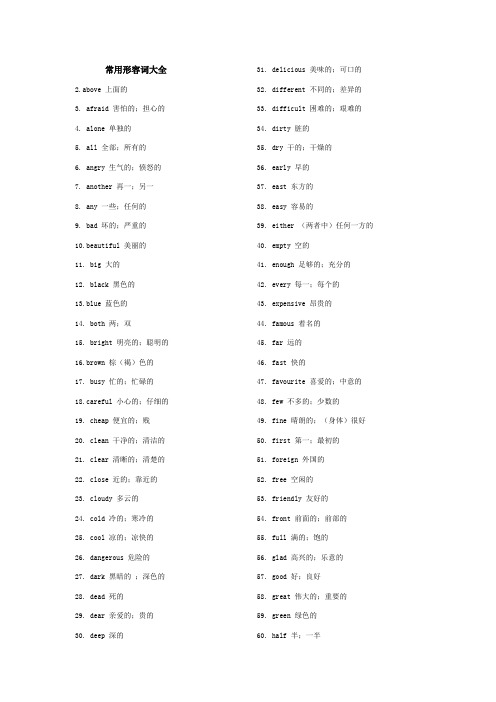
常用形容词大全2.above 上面的3. afraid 害怕的;担心的4. alone 单独的5. all 全部;所有的6. angry 生气的;愤怒的7. another 再一;另一8. any 一些;任何的9. bad 坏的;严重的10.beautiful 美丽的11. big 大的12. black 黑色的13.blue 蓝色的14. both 两;双15. bright 明亮的;聪明的16.brown 棕(褐)色的17. busy 忙的;忙碌的18.careful 小心的;仔细的19. cheap 便宜的;贱20. clean 干净的;清洁的21. clear 清晰的;清楚的22. close 近的;靠近的23. cloudy 多云的24. cold 冷的;寒冷的25. cool 凉的;凉快的26. dangerous 危险的27. dark 黑暗的;深色的28. dead 死的29. dear 亲爱的;贵的30. deep 深的31. delicious 美味的;可口的32. different 不同的;差异的33. difficult 困难的;艰难的34. dirty 脏的35. dry 干的;干燥的36. early 早的37. east 东方的38. easy 容易的39. either (两者中)任何一方的40. empty 空的41. enough 足够的;充分的42. every 每一;每个的43. expensive 昂贵的44. famous 着名的45. far 远的46. fast 快的47. favourite 喜爱的;中意的48. few 不多的;少数的49. fine 晴朗的;(身体)很好50. first 第一;最初的51. foreign 外国的52. free 空闲的53. friendly 友好的54. front 前面的;前部的55. full 满的;饱的56. glad 高兴的;乐意的57. good 好;良好58. great 伟大的;重要的59. green 绿色的60. half 半;一半61. happy 高兴的;幸福的62. hard 困难的63. healthy 健康的;卫生的64. heavy 重的65. high 高的66. hot 热的67. hungry 饥饿的68. ill 生病的;不健康的69. important 重要的70. interested 感兴趣的;关心的71. interesting 有趣的72. kind 友好的;和善的73. large 大的;巨大的74. last 最后的;最近刚过去的75. late 迟的;晚的76. lazy 懒惰的77. left 左边的78. light 轻的;浅色的79. little 小的;少的80. long (距离)长的/远的81. loud 大声的;响亮的82. low 底的;矮的83. lucky 运气好的;侥幸的84. many 许多的85. modern 现代的86. much 许多的;大量的87. near 近的88. neither (两者)都不89. new 新的;新鲜的90. next (距离)最近的;紧挨的91. nice 美好的;令人愉快的92. no 没有93. north 北方的94. old 旧的;年老的95. only 唯一的;仅有的96. open 开着的;开口的97. orange 橙色的98. other 别的;另外的99. polite 有礼貌的100. poor 贫穷的101. popular 流行的102. possible 可能的;可能发生的103. quick 快的;迅速的104. quiet 安静的105. ready 准备好的106. red 红色的107. rich 富裕的;有钱的108. right 右边的;正确的109. round 圆的;球形的110. sad 悲伤的;使人悲伤的111. same 同样的112. second 第二113. serious 严重的;认真的114. several 几个;若干115. short 短的;矮的116. sick 生病的;有病的117. slow 慢的;缓慢的118. small 小的;少的119. some 一些;几个120. sorry 对不起的;难过的121. south 南方的122. strong (身体)强壮的123. such 这样的;那样的124. sure 肯定的;确定的125. sweet 甜的126. tall 高的127. terrible 可怕的;极不舒服的128. that 那;那个129. these 这些130. thin 瘦的;薄的131. thirsty 口渴的132. this 这;这个133. those 那些134. tired 疲劳的;累的135. true 真的;真实的136. useful 有用的;有益的137. usual 通常的;平常的138. warm 暖和的;温暖的139. weak 差的;弱的140. well 好的;健康的141. wet 湿的;潮的142. west 西方的143. what 多么;何等;什么144. which 哪一个;哪些145. white 白色的146. whole 整个的147. wide 宽的;宽阔的148. wonderful 极好的;精彩的149. wrong 错误的;不对的150. yellow 黄色的151. young 年轻的1)historic: famous in history, 历史上著名的associated with past times 与过去时代有关的a ~ event/speech/spothistorical: belong to history 历史上的a ~ people/novel/play/film/painting~ trend2) electric: worked by, changed with,producing electricity 用电的,带电的, 有电的~ current/cableelectrical: relating to electricity,an idea of a less close connection with electricity~ engineering/apparatus3) economic: of economics~ policy/geography/crisis/cropseconomical: careful in the spending of money and time, not waste 经济的,节俭的an ~ housewife/store4) industrial: of industries 工业的the ~ revolution/products/systemindustrious: hard-working, diligent~ people5) considerable: great much 相当多(大)的a ~ income/distanceconsiderate: thoughtful 体谅的,体贴的周到的She is ~ to others.6) sensible: reasonable, having good sense 实用的,明知的a ~ woman/idea/ 豁达的妇女/明知的观点~ clothes 实用的衣服sensitive: quick to receive impression 敏感的a ~ skin~ paper 感光纸7) continual: going on all the time without stopping or with only short breaks,stop and go repeatedly, 连续的,断断续续的~ rain/noisecontinuous: going on without a break, an uninterrupted flow 连续不断的~ fight/work8) intense: high in degree 强烈的,剧烈的,高度的~ heat炽热/painan ~ lady 热情的女子intensive: deep and thorough 精深的,集中的~ reading/study彻底研究/agriculture密集农业9)respectable: deserving respect, 值得尊敬的,有名望的a ~ man/professionrespectful: showing respect 尊敬人的,有礼貌的,He is always ~to the elders.respective: belongs to each of these 分别的,各自的They sat on their ~ chairs.10) imaginable: that can be imagined 可象想的~ difficultiesimaginary: existing only in the mind, unreal 想象中的,不真实的~ figureimaginative: of, having, using imagination 有想象力的,运用想象力的a ~ writer11) intelligent: having, showing intelligence, clever 有才智的, 聪明的an ~ looking girl ~ answerintelligible: clear to mind, that can be easily understood. 易了解的, 易领悟的an ~ speech/explanationintellectual: possessing a great deal of knowledge 知识的, 智力的12) contemptible: deserving contempt 可卑的a ~ liecontemptuous: showing contempt 表示轻视的a ~ look13) credible: that can be believed 可信的,可靠a ~ witnesscredulous: too ready to believe things. 轻易相信的,易上当的He always cheats ~ people.creditable: that brings credit. 可称赞的a ~ record/deed/effort14) alternate: changing by turns 轮流的,交替的alternative: giving a choice between two things选择的,两者选一的15) comparable 可比较的,有类似之处的comparative 比较而言的,相当的There is no scenery comparable to that of the West lake.He lived in comparative comfort recently. 16) politic 精明的political 政治的17) beneficial 有益的beneficent 多多行善的18) official 官方的officious 多管闲事的19) potent 强有力的potential 潜在的,可能的20) confident 有信心的,自信的confidential 机密的21) negligent 忽视的,粗心大意的negligible 可忽视的22) momentary 瞬时的,短时的momentous 重大的23) memorable 值得记忆的,不能忘却的memorial 纪念的24) social 社会的sociable 善社交的25) childish 幼稚的childlike 孩子般的26) distinct: clear 明显的,清晰的distinctive: characteristic 独特的,有区别的27) classic 一流的classical 古典的28) comprehensible 可理解的comprehensive 全面的,综合的29) disinterested 公平的uninterested 冷淡的30) earthly 人间的,尘世的earthy 泥土似的31) effective 有效的efficient 有效率的effectual 奏效的32) exceptionable 反对的exceptional 非凡的33) fatal 致命的fateful 决定性的34) fleshly 肉体的fleshy 肥胖的35) homely 家常的homelike 象家的36) im(un)practical 不切合实际的impracticable 无法使用的37) ingenious 有独创性的ingenuous 直率的,天真的38) manly 男人气派的male 男的masculine 男性的39) movable 可移动的,变动的mobile 可动的,活动地40) mysterious 神秘的mystical 奥妙的41) notable 著名的(指事)noted 著名的(指人)42) practical 实际的practicable 可行的,通行的43) regretful 遗憾的(指人)regrettable 遗憾的(指事)44) seasonable 及时的seasonal 季节的45) spiritual 精神的spirituous 酒精的46) tortuous 弯曲的torturous 受刑的47) transitory 短时间的(指事)transient 瞬时的(指人)48) elementary 基本的elemental 自然的49) healthy 健康的healthful 有易于健康的50) likely 可能的likable 可爱的51) desirable 合意的desirous 渴望的52)clean 干净的cleanly 有干净习惯的Are cats cleanly animals?53) kind 慈善地kindly 友好的,亲切的54) temporal 一时的, 暂时的, 世俗的temporary 暂时的, 临时的。
常用形容词
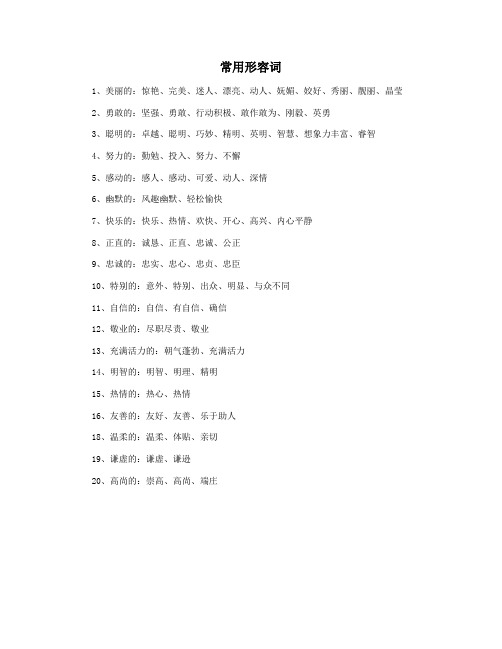
常用形容词
1、美丽的:惊艳、完美、迷人、漂亮、动人、妩媚、姣好、秀丽、靓丽、晶莹
2、勇敢的:坚强、勇敢、行动积极、敢作敢为、刚毅、英勇
3、聪明的:卓越、聪明、巧妙、精明、英明、智慧、想象力丰富、睿智
4、努力的:勤勉、投入、努力、不懈
5、感动的:感人、感动、可爱、动人、深情
6、幽默的:风趣幽默、轻松愉快
7、快乐的:快乐、热情、欢快、开心、高兴、内心平静
8、正直的:诚恳、正直、忠诚、公正
9、忠诚的:忠实、忠心、忠贞、忠臣
10、特别的:意外、特别、出众、明显、与众不同
11、自信的:自信、有自信、确信
12、敬业的:尽职尽责、敬业
13、充满活力的:朝气蓬勃、充满活力
14、明智的:明智、明理、精明
15、热情的:热心、热情
16、友善的:友好、友善、乐于助人
18、温柔的:温柔、体贴、亲切
19、谦虚的:谦虚、谦逊
20、高尚的:崇高、高尚、端庄。
四字成语形容词
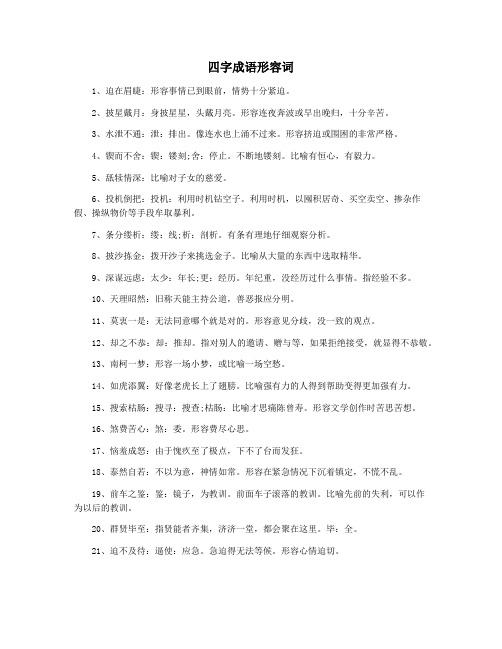
四字成语形容词1、迫在眉睫:形容事情已到眼前,情势十分紧迫。
2、披星戴月:身披星星,头戴月亮。
形容连夜奔波或早出晚归,十分辛苦。
3、水泄不通:泄:排出。
像连水也上涌不过来。
形容挤迫或围困的非常严格。
4、锲而不舍:锲:镂刻;舍:停止。
不断地镂刻。
比喻有恒心,有毅力。
5、舐犊情深:比喻对子女的慈爱。
6、投机倒把:投机:利用时机钻空子。
利用时机,以囤积居奇、买空卖空、掺杂作假、操纵物价等手段牟取暴利。
7、条分缕析:缕:线;析:剖析。
有条有理地仔细观察分析。
8、披沙拣金:拨开沙子来挑选金子。
比喻从大量的东西中选取精华。
9、深谋远虑:太少:年长;更:经历。
年纪重,没经历过什么事情。
指经验不多。
10、天理昭然:旧称天能主持公道,善恶报应分明。
11、莫衷一是:无法同意哪个就是对的。
形容意见分歧,没一致的观点。
12、却之不恭:却:推却。
指对别人的邀请、赠与等,如果拒绝接受,就显得不恭敬。
13、南柯一梦:形容一场小梦,或比喻一场空愁。
14、如虎添翼:好像老虎长上了翅膀。
比喻强有力的人得到帮助变得更加强有力。
15、搜索枯肠:搜寻:搜查;枯肠:比喻才思痛陈曾寿。
形容文学创作时苦思苦想。
16、煞费苦心:煞:委。
形容费尽心思。
17、恼羞成怒:由于愧疚至了极点,下不了台而发狂。
18、泰然自若:不以为意,神情如常。
形容在紧急情况下沉着镇定,不慌不乱。
19、前车之鉴:鉴:镜子,为教训。
前面车子滚落的教训。
比喻先前的失利,可以作为以后的教训。
20、群贤毕至:指贤能者齐集,济济一堂,都会聚在这里。
毕:全。
21、迫不及待:逼使:应急。
急迫得无法等候。
形容心情迫切。
22、明察秋毫:明察:看清;秋毫:秋天鸟兽身上新长的细毛。
原形容人目光敏锐,任何细小的事物都能看得很清楚。
后多形容人能洞察事理。
23、棋逢对手:逢:碰面。
打牌碰到劲敌。
比喻争斗的双方本领不相上下。
24、穷兵黩武:穷:竭尽;黩:随便,任意。
随意使用武力,不断发动侵略战争。
形容极其好战。
常用100个形容词
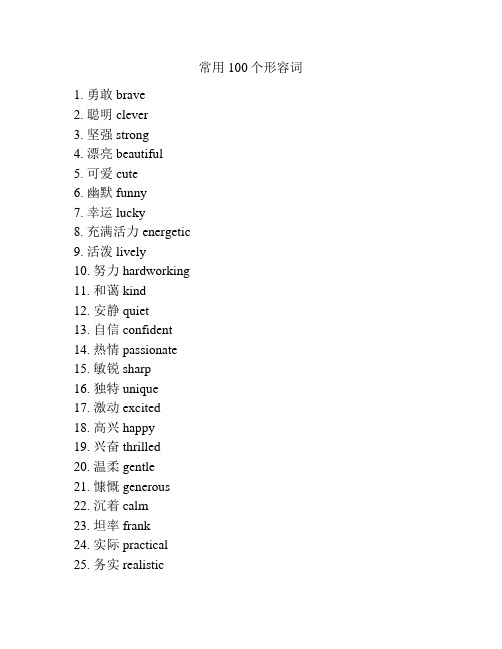
常用100个形容词1. 勇敢 brave2. 聪明 clever3. 坚强 strong4. 漂亮 beautiful5. 可爱 cute6. 幽默 funny7. 幸运 lucky8. 充满活力 energetic9. 活泼 lively10. 努力 hardworking11. 和蔼 kind12. 安静 quiet13. 自信 confident14. 热情 passionate15. 敏锐 sharp16. 独特 unique17. 激动 excited18. 高兴 happy19. 兴奋 thrilled20. 温柔 gentle21. 慷慨 generous22. 沉着 calm23. 坦率 frank24. 实际 practical25. 务实 realistic26. 友好 friendly27. 乐观 optimistic28. 深思熟虑 thoughtful29. 成熟 mature30. 清晰 clear31. 无畏 fearless32. 强大 powerful33. 灵活 flexible34. 有耐心 patient35. 好奇 curious36. 坚定 determined37. 愉快 cheerful38. 含蓄 reserved39. 尊重 respectful40. 精力充沛 energetic41. 热心 enthusiastic42. 宽容 tolerant43. 谨慎 cautious44. 无私 selfless45. 聪明 intelligent46. 敏感 sensitive47. 安详 serene48. 温和 mild49. 忠诚 loyal50. 谦虚 humble51. 风趣 witty52. 坚实 solid53. 冷静 tranquil54. 无畏 fearless55. 敏捷 agile56. 平和 peaceful57. 领悟 insightful58. 能干 capable59. 洞察力 perceptive60. 热情的 passionate61. 精明 shrewd62. 整洁 neat63. 负责 responsible64. 实用 useful65. 活泼的 lively66. 有趣 interesting67. 坚持 persevering68. 快乐 joyful69. 深刻 profound70. 可靠 reliable71. 安定 stable72. 宽容 forgiving73. 勤劳 diligent74. 积极 positive75. 博学 learned76. 有礼 polite77. 乐观 cheerful78. 聪慧 wise79. 随和 easy-going80. 现代 modern81. 精确 accurate82. 慷慨 generous83. 清楚 clear84. 敏锐 sharp85. 智慧 wise86. 活跃 active87. 公正 fair88. 温和 mild89. 虚心 humble90. 冷静 calm91. 严谨 precise92. 勤奋 hardworking93. 负责 responsible94. 谨慎 careful95. 合理 reasonable96. 能干 competent97. 忠实 faithful98. 多才 versatile99. 悠闲 leisurely 100. 独立 independent。
汉语形容词大全
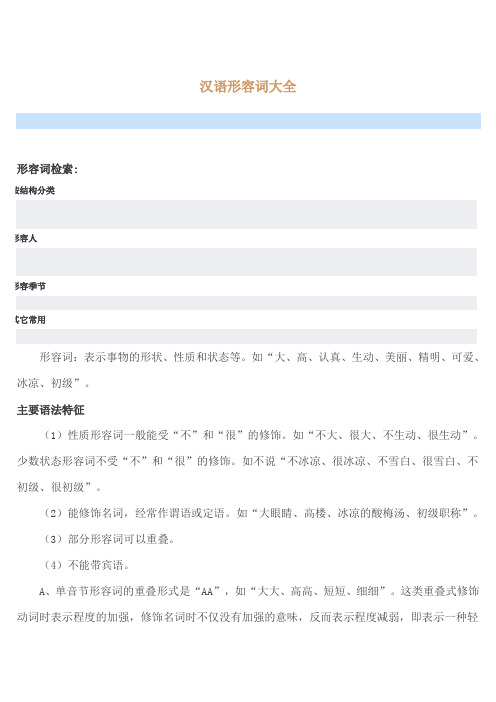
汉语形容词大全形容词检索:按结构分类形容人形容季节其它常用形容词:表示事物的形状、性质和状态等。
如“大、高、认真、生动、美丽、精明、可爱、冰凉、初级”。
主要语法特征(1)性质形容词一般能受“不”和“很”的修饰。
如“不大、很大、不生动、很生动”。
少数状态形容词不受“不”和“很”的修饰。
如不说“不冰凉、很冰凉、不雪白、很雪白、不初级、很初级”。
(2)能修饰名词,经常作谓语或定语。
如“大眼睛、高楼、冰凉的酸梅汤、初级职称”。
(3)部分形容词可以重叠。
(4)不能带宾语。
A、单音节形容词的重叠形式是“AA”,如“大大、高高、短短、细细”。
这类重叠式修饰动词时表示程度的加强,修饰名词时不仅没有加强的意味,反而表示程度减弱,即表示一种轻微的程度。
例如:大大缩短了距离(程度加强)大大的眼睛(与“大眼睛”相比程度减弱)高高举起(程度加强)高高的个儿(与“高个儿”相比,程度减弱)B、双音节形容词的重叠一般表示程度的加强,有三种格式:a、AABB:口口声声断断续续浩浩荡荡开开心心干干净净松松散散密密麻麻冷冷清清来来往往踉踉跄跄大大方方客客气气说说笑笑的的确确反反复复方方正正实实在在踏踏实实扎扎实实平平安安是是非非堂堂正正偷偷摸摸唯唯否否快快乐乐蝎蝎螫螫形形色色铮铮佼佼白白胖胖陆陆续续洋洋洒洒战战兢兢零零散散老老实实遮遮掩掩b、A里AB:这里的AB限于某些含贬义的形容词,重叠后既表示程度加强,又表明嫌恶的感情。
如:小里小气古里古怪慌里慌张糊里糊涂马里马虎c、ABAB:这里的AB只限于某些带有表示程度的语素的双音节形容词。
如:冰凉冰凉雪白雪白通红通红笔直笔直碧绿碧绿鲜红鲜红C、重叠属于形容词生动形式。
形容词生动形式除了重叠之外还有单音节形容词A加双音节或多音节后缀这种形式。
a、A+双音节后缀:这个后缀一般是叠音的。
如:暖洋洋醉醺醺香喷喷干巴巴沉甸甸羞答答亮晶晶沉甸甸白花花绿油油黑黝黝慢腾腾阴森森皱巴巴亮铮铮笑嘻嘻香喷喷乱哄哄黑漆漆轻飘飘湿漉漉红彤彤骨碌碌雾朦朦喜盈盈亮晶晶黄灿灿孤零零毛绒绒胖乎乎一颗颗一簇簇绿油油黄澄澄红彤彤光闪闪油乎乎光溜溜黑油油粘糊糊亮晶晶脏兮兮皱巴巴干巴巴松塌塌胖墩墩肉墩墩瘦巴巴瘦嶙嶙喜洋洋喜滋滋喜冲冲兴冲冲乐悠悠乐陶陶乐滋滋白花花绿莹莹黄澄澄绿油油明晃晃慢腾腾沉甸甸b、A+多音节后缀,如:黑不溜秋黑咕隆咚花里胡哨傻不愣登蠢了呱叽形容词的生动形式不受“不”和“很”的修饰。
形容词大全及分类(含释义)

常用形容词大全及分类(含释义)三字常用形容词,含释义:以下是各类三字形容词的大全,涵盖了色彩、形态、情感、气味、声音、质地、速度和光线等方面。
这些形容词可以帮助我们更生动、准确地描述事物和场景,丰富语言表达。
一、色彩类1. 红彤彤:形容物品或人的面色非常红润。
2. 金灿灿:形容物品表面闪着金光,非常耀眼。
3. 黑漆漆:形容非常黑暗,光线不足。
4. 白茫茫:形容一片白色,无边无际。
5. 绿油油:形容植物或草地非常绿,生机勃勃。
二、形态类1. 胖乎乎:形容人或动物身体丰满,显得可爱。
2. 圆滚滚:形容物体形状圆润,滚动自如。
3. 瘦长长:形容人或物体纵向延伸,显得修长。
4. 方方正正:形容物体形状规则,四边平直。
5. 弯弯曲曲:形容物体形状曲折多变,不直。
三、情感类1. 笑嘻嘻:形容面部表情愉快,带有笑意。
2. 哭啼啼:形容哭泣的声音,表达悲伤情绪。
3. 懒洋洋:形容人精神不振,行动迟缓。
4. 急匆匆:形容行动匆忙,急切的样子。
5. 气冲冲:形容人愤怒,情绪激烈。
四、气味类1. 香喷喷:形容食物或物品散发出浓郁的香气。
2. 臭烘烘:形容物品发出难闻的气味。
3. 腥膻膻:形容某些食物或动物散发出的特殊气味。
4. 甜腻腻:形容食物味道甜而腻人。
5. 酸溜溜:形容食物味道酸,有刺激性。
五、声音类1. 嗡嗡嗡:形容昆虫飞行或机器运转的声音。
2. 哗哗哗:形容水流的声音或风吹过树叶的声音。
3. 咯咯咯:形容笑声或鸟鸣声。
4. 嘀嘀嘀:形容汽车喇叭声或计时器的声音。
5. 轰隆隆:形容雷声、爆炸声或机器运转声。
六、质地类1. 软绵绵:形容物品触感柔软,有弹性。
2. 硬邦邦:形容物品触感硬实,不易变形。
3. 滑溜溜:形容物品表面平滑,触感滑腻。
4. 毛茸茸:形容物品表面覆盖着柔软细小的毛发。
5. 糙糙拉拉:形容物品表面粗糙,不平滑。
七、速度类1. 慢悠悠:形容速度缓慢,不急不躁。
2. 急匆匆:形容速度较快,行动匆忙。
- 1、下载文档前请自行甄别文档内容的完整性,平台不提供额外的编辑、内容补充、找答案等附加服务。
- 2、"仅部分预览"的文档,不可在线预览部分如存在完整性等问题,可反馈申请退款(可完整预览的文档不适用该条件!)。
- 3、如文档侵犯您的权益,请联系客服反馈,我们会尽快为您处理(人工客服工作时间:9:00-18:30)。
Edison was one of the greatest inventors in the world. 爱迪生是世界上最为大的发明家之一。
4. 形容词最高级的前面常有the,my等形容词性物主代词,China’s名词所有格
This is my busiest day. 这是我最忙的一天。
John is the cleverest of all the boys. 约翰是所有男孩中最聪明的。
Kate is the tallest of the three. 凯特是那三个当中个子最高的。
This is the best film that I’ve ever seen. 这是我所看过的最好的电影。
你买的鞋比他买的鞋昂贵。
二. 比较级后接代词时要辨明主格或宾格。例如:
I know you better than he.(句一)
I know you better than him.(句二)
注意这两句的区别:
句一的意思是,我对你的了解胜过他对你的了解。
句二的意思是,我对你的了解胜过对他的了解。
天越来越黑了。
He is getting more and more interested in sports.
他对体育越来越感兴趣。
四. The more...the more
The more you eat, the more you want.
你越吃越想要。
五. 两者中更为胜出的情况要加“the”
形容词的定义
形容词是修饰名词表示名词属性的词,常放在它所修饰的名词之前。若修饰复合不定代词则放在其后。
一、形容词作定语修饰名词:
He’s a tall man.
他是个高个子的男子。
二、形容词作定语修饰复合的不定代词:
I have something important to tell you.
他比我高。
He is two heads taller than I.
他比我高出两个头。
二. 在which,_or_?句中,表示两者比较
Which is bigger, the sun or the moon?
太阳和月亮,哪一个更大?
三. 比较级and比较级
It’s getting darker and darker.
He is the taller one of the two.
他是两人当中较高的那位。
形容词比较级的用法 2
形容词比较级前可受much,far,a lot,still,no,a little,even,any
修饰,表示超出的程度
1. much
We have a much better life now.
<><><>
My brother is rather better today.
今天我的弟弟好多了。
This hat is rather more expensive than that one.
这顶帽子比
级的修饰:much
much 可以接比较级,也可以接最高级。
形容词原级的用法
形容词原级可以被very,quite,so,rather等词的修饰
1. very 非常
This is a very interesting book.
这是一本很有趣的书。
<><><>
(注:very 也可以接形容词最高级,表示强调。)
格式是:the very + est结尾的形容词最高级或是不规则形容词最高级
It’s still colder today. 今天更冷一些。
7. any
Have you any more? 你还有吗?
Oh, sorry, no more. 哦,对不起,没有了。
8. no
She’s no better yet.
她一点也没好转。
The train is no longer in sight.
2. 在which,_,_or_?句中,表示三者或三者以上比较
Which is the biggest, the sun, the moon or the earth? 太阳,月亮,地球,哪一个最大?
3. 形容词最高级表示“最...之一”时,可用“one of the+最高级+复数名词”
形容词最高级的用法
1.表示三者或三者以上,通常含有in,of介词短语和定语从句的句子
Autumn is the best season in Beijing. 秋天是北京最好的季节。
She is the most intelligent girl in the whole school. 她是全校最有才华的女生。
我认为他是最好的演讲者。
It’s a most useful book. 它是一本非常有用的书。
级的修饰:too
too 的后面接原级。
<><><>
too late 太晚了
too big for him 对他来讲太大了
too proud to ask for help 太过骄傲以致不肯寻求帮助
careful ,more careful, most careful 仔细的
popular, more popular, most popular 流行的
形容词的比较级和最高级(不规则)1
不规则形容词比较等级的形式变化
good-better-best 好的
火车再也看不见了。
比较的对象要明确
一. 当比较对象受到限定时,要注意找准比较对象。例如:
Is the climate of Italy warmer than that of Florida?
意大利的天气比佛罗里达暖和吗?
The shoes you bought are more expensive than those he bought.
我想你不留下来有点太不友善了。
形容词的同级比较
在 as...as 和 not so...as 的中间形容词常用原级。
1. as...as 表示相等
This knife is as sharp as that one.
这把刀和那把一样锋利。
He is as tall as I.
(little-littler-littlest 小的)
far-further-furthest 远(指更进一步,深度。亦可指更远)
far-farther-farthest 远(指更远,路程)
old-older-oldest 年老的(指年纪)
old-elder-eldest 年老的(指兄弟姐妹的排行)
rather too deeply 颇为太深了
slightly too long 些微长了一点
a bit too small 有点太小
too easy an answer 一个太容易的答案
much too high 高的多
<><><>
( You don’t use fairly, quite, a bit in front of too.)
well-better-best 身体好的
bad-worse-worst 坏的
ill-worse-worst 病的
many-more-most 许多
much-more-most 许多
few-less-least 少数几个
little-less-least 少数一点儿
The Changjiang River is China’s longest river. 长江是中国最长的河流。
5. 形容词最高级可以被very修饰,表示强调
I’ll do my very best.
我一定要尽力而为。
6. most有时和形容词连用,前面用不定冠词,表示“非常”
例:the very lowest price
<><><>
2. quite 相当
It’s quite cold this morning.
今天早晨相当冷。
3. so 那么
You are so fast.
你那么快。
4. rather 有些,颇
I think you’re rather unkind not to stay.
big-bigger-biggest 大的
thin-thinner-thinnest 瘦的
hot-hotter-hottest 热的
4. 以辅音字母+y结尾的双音节词改y为i,再加-er或-est
easy-easier-easiest 容易的
early-earlier-earliest 早的
这个故事比那个更有趣。
4. a lot
I made a lot more mistakes than you (did).
我犯的错误比你多多了。
5. a little
Your cake is a little larger than mine.
你的蛋糕比我的大一点儿。
6. still
在 too 的前面不能用 fairly, quite, a bit 等。
级的修饰:rather
rather 的后面可以接原级,也可以接比较级:
<><><>
